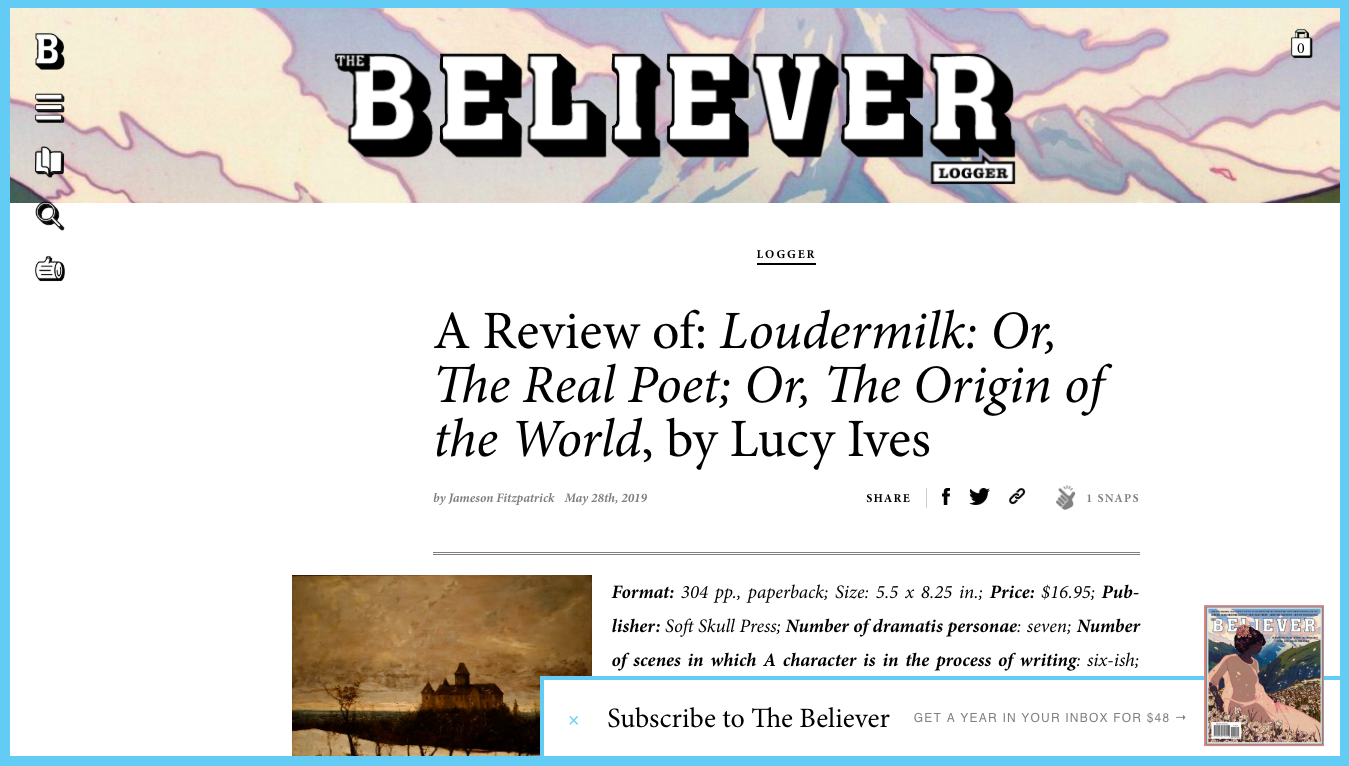A Review of: Loudermilk: Or, The Real Poet; Or, The Origin of the World, by Lucy Ives
by Jameson Fitzpatrick
May 28th, 2019
Format: 304 pp., paperback; Size: 5.5 x 8.25 in.; Price: $16.95; Publisher: Soft Skull Press; Number of dramatis personae: seven; Number of scenes in which A character is in the process of writing: six-ish; Number of metafictional stories and poems appearing within: eleven; Number of fonts used: three; Number of uncomfortable moments of recognition writers are likely to experience while reading: countless.
Central Question: How does a person write (about writing)?
On December 3, 1961, Susan Sontag wrote the following in her journal:
The writer must be four people:
1) The nut, the obsédé
2) The moron
3) The stylist
40 The critic
1 supplies the material; 2 lets it come out; 3 is taste; 4 is intelligence.
A great writer has all 4—but you can still be a good writer with only 1 and 2; they’re most important.
I thought of Sontag’s formulation often while reading Lucy Ives’s new novel Loudermilk: Or, The Real Poet; Or, The Origin of the World, as the titular character is a writer who is quite literally more than one person. Loudermilk centers on two friends conning their way through the 2003–2004 academic year at “the Seminars,” a prestigious Midwestern MFA program very transparently modelled on the Iowa Writers’ Workshop (Ives is an alumna). The charismatic Troy Loudermilk attends classes and is the one officially matriculated, while his extraordinarily shy sidekick Harry Rego ghostwrites the poems. As Loudermilk/Harry’s work arouses the admiration—and suspicion—of those around them, the teenaged daughter of two poetry faculty vies for Loudermilk’s affection, and a fiction student removed from the rest of the action struggles to write. Though Ives’s portrait of the Seminars/Workshop is more farcical than flattering, readers expecting yet another referendum on the MFA will be pleasantly surprised to discover a much stranger and more ambitious book. In Loudermilk, Ives has taken a subject notoriously difficult to make interesting—the difficulty of writing itself—and narrativized it into an elaborate plot peopled by avatars of the types Sontag enumerated decades ago.
Loudermilk, who plays chicken with a semi-truck in the novel’s opening scene and sends emails from prufrock69@hotmail.com, is Ives’s moron (2), or fool (a substitution I’ll be making given “moron”’s eugenicist history). Importantly, he is quite wealthy, the sole heir of a former military contractor turned disaster profiteer, and quite hot: “He is six foot three and built like a water polo champion. His face is hard to look away from.” He is also (if this were not already obvious) white, straight, cis, and able-bodied, biographical details frequently correlated with an assumed (if unearned) sense of authority—Loudermilk doesn’t have to write a word to feel right at home at the Seminars. In her afterword, Ives refers to him as a libertine, and indeed, Loudermilk is so free of shame he seems incapable of the emotion, a handy lack for a would-be writer to have. If, per Sontag, one must be a fool in order to muster the confidence necessary for self-expression, Loudermilk’s superlative confidence reflects a profound foolishness.
Only it isn’t his self that Loudermilk is expressing—at least not in the poems that quickly distinguish him as one of the Seminars’ star students. Those are secretly written by Harry, the Cyrano de Bergerac to Loudermilk’s Christian de Neuvillette (whose classic tale of literary impersonation Ives cites as an inspiration in the afterword). The two unlikely pals are collaborators on a hare-brained scheme that began on a whim: during their senior year at SUNY Oswego, Loudermilk discovered the existence of funded graduate programs in poetry and decided it would be a fun and easy way to spend two years. Harry, a former child genius who started college at fifteen, is more than happy to play along, particularly since their arrangement requires him to interact with no one but his trusted symbiont (he has an aversion to his own voice so pronounced that it renders him unable to speak in most situations).
It’s not just Harry’s prodigious intelligence that makes him the critic (4) in Ives’s story, but also his approach to writing poetry. Harry writes because he has to provide Loudermilk’s lines, not because because he has something to say—at least not at first—and so his entrée to poetry comes through analysis rather than inspiration. Like any good counterfeiter, he first has to understand how the thing is made:
Harry knows, based on his limited poetical reading, but whatever, that he’s supposed to be using language that might “mean more than one thing” when he’s creating a poem. But it’s confusing to him how exactly this should work, from the point of view of production. For this reason, he’s developing a work-around. He’s decided to find language that definitely means one thing and then try his best to use it in another way, so that it definitely cannot mean the very thing it usually means—which is to say, exclusively.
As he collages appropriated language into poems that parody the vernacular of American empire in the early aughts, Harry’s first subject becomes doublespeak; or, language itself.
The true nut or obsédé (1) here—the personality who, according to Sontag, provides a writer’s material—is Lizzie Hillary, the precocious fifteen-year-old daughter of two members of the Seminars’ poetry faculty. The undeserving object of her affection is (of course) Loudermilk, who, much to her mounting frustration but certain benefit, she fails to woo. Does anyone have a greater capacity for obsession than a teenager in love? Yet Ives is careful not to reduce Lizzie to a caricature; she is not frivolous (Harry recognizes her at once as “a worthy fucking competitor”). In fact, Lizzie is the first to see—almost immediately—through Loudermilk’s act, and even her infatuation with him belies another, more nebulous desire: to grow up and into an artist. Once again, Loudermilk is just a stand-in.
Finally, there is Clare Elwil, a first-year student in fiction and our resident stylist (3) (Ives declares this outright on page 10). The daughter of a minor but notable expat poet from whom she has long been estranged, and blessed with the kind of C.V. you might expect from an Iowa grad announcing their six-figure first book deal, Clare shares some of Loudermilk’s material advantages, though hers come along with significantly more baggage. Having deferred admission after a serious car accident, she is arriving to the Seminars a year late and with a bad case of trauma-induced writer’s block. Clare’s struggle to write constitutes her entire subplot (her story barely intersects with the other characters’) and the question of style—how to say what she has to say—is both her primary obstacle and ultimate salvation.
We are introduced to Clare via “two terse sentences [she] has been writing for the past ten weeks” Here, and in Clare’s scenes throughout the novel, Ives captures with painfully vivid detail how it feels when words fail you, or, worse, when you fail words:
It is in description now that Clare has a tendency to become most mired. No, now it is in description that Clare has a tendency to become the most mired. The tendency? Is that the word? Mired? The? She slides back and forth, on wheels, mobile yet unable to pass over the hump that stands between her and poised, proper articulation.
Over the course of the novel, Clare reflects on her past success (a prize-winning short story she remembers as “an exercise in style”), struggles with two unfinished drafts, and, at long last, writes a new story, tricking herself into success by “[telling] herself she is not the one writing.” Her classmates highlight “her unique style” in their praise.
Through these characters and their respective fates, Loudermilk posits that all artistic creation requires the use of a proxy. Harry needs to use Loudermilk’s voice to find his own. Lizzie needs to use Loudermilk as a receptacle for her ambition until it can take another form—a work of guerilla art she titles The Origin of the World, after Clare’s story of the same title, which is itself titled after Gustave Courbet’s L’Origine du monde. Clare has to pretend to be someone else in order to write like herself. It is only in their proxies that they are finally able to recognize themselves.
Sontag says a good writer must be a fool and an obsessive, that the critic and the stylist are bonuses (so, inessential). But Ives—not just for her own erudition and syntactical artistry, remarkable as they are—counters that it is the critic and the stylist who are indispensable, for they are the ones who interface thought with language. Obsessions can be substituted, replaced, and tend to descend on us whether our nature is obsessive or not. Likewise, a fool’s confidence can be adopted when necessary; it’s no coincidence “bravado” so often collocates with “false” (or that Loudermilk is the only one of these characters without any apparent artistic promise of his own). Taste and intelligence can be faked, too, of course, but a good writer nevertheless must develop them sometime. Perhaps it is, after all, through the faking that the making happens.

